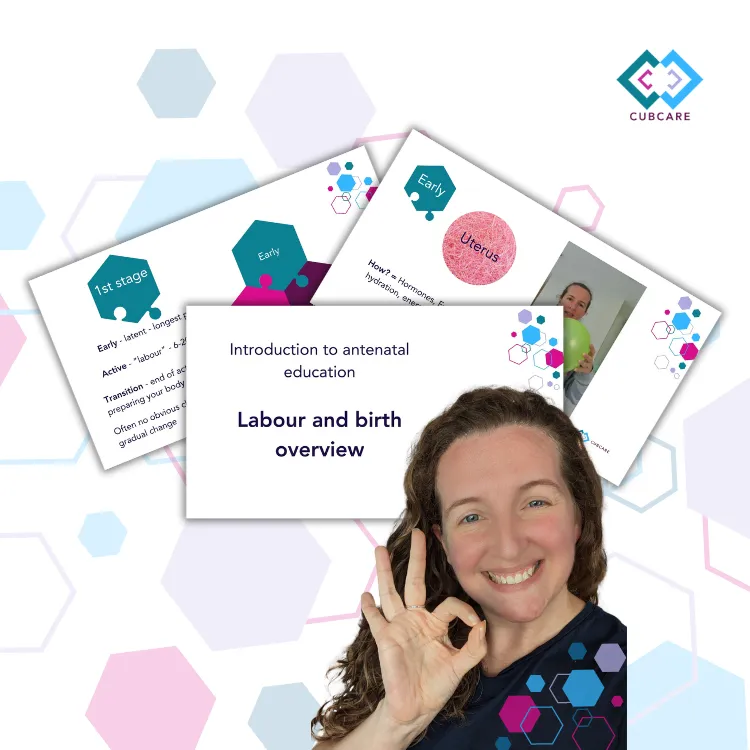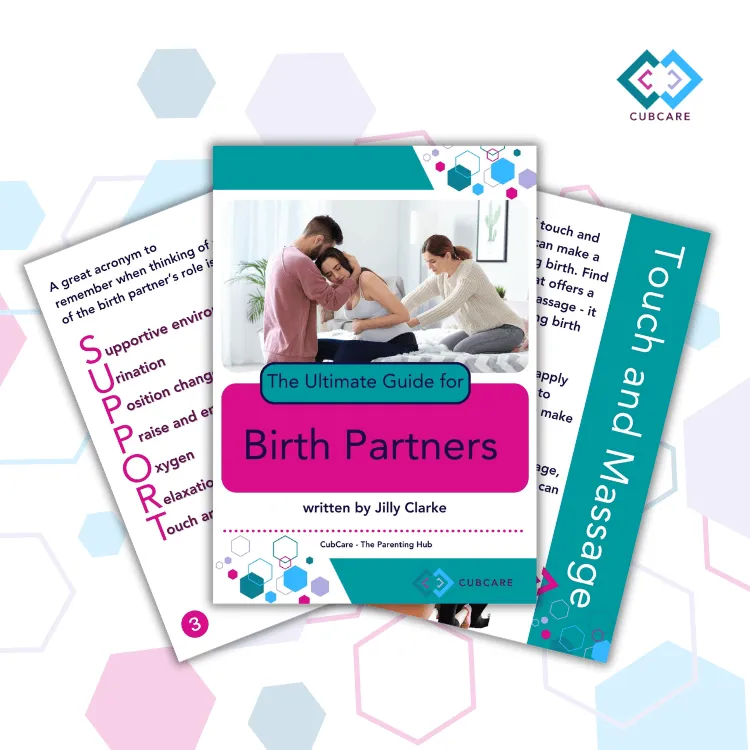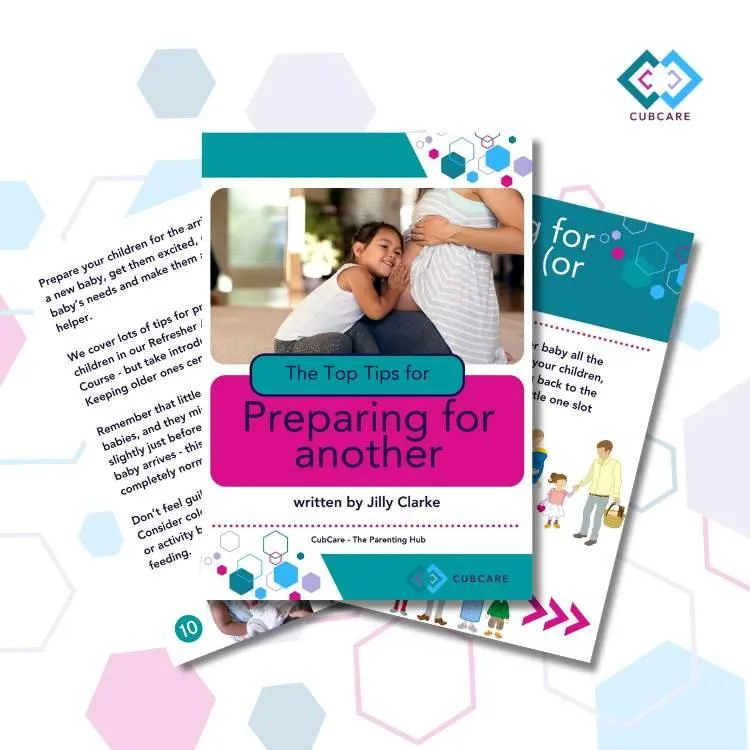We're an award winning Antenatal and Postnatal Education Platform 2025!
(read more here)
CubCare blogs.
From early pregnancy to newborn development.
Advice to help through pregnancy, birth and childhood.
BLOG

Labour Contractions vs. Period Pains: What Do Contractions Feel Like?
"You can think of labour contractions being a bit like a blood pressure monitor. The pressure, tightening and discomfort builds until it hits a peak and can not get any more intense. It often stays at the peak for a few seconds before easing off and gently releasing." - Jilly Clarke
Labour contractions vs. Period pains: What do contractions feel like?
For many, the journey to parenthood brings up questions about what to expect during labour, especially when it comes to pain. One common comparison people make is between period pains and labour contractions. Are they similar, or is labour truly on another level? Let’s break it down.

What do contractions feel like?
Labour contractions, like period pains, involve the uterus contracting. But this time, it's preparing to bring a baby into the world. Initially, these contractions may feel like stronger period pains, but as labour progresses, the intensity ramps up significantly.
Unlike period cramps, which can be continuous, labour contractions come in waves. There's a peak of intensity followed by a break, giving you time to rest (even if just for a moment). You can think of labour contractions being a bit like a blood pressure monitor. The pressure, tightening and discomfort builds until it hits a peak and can not get any more intense. It often stays at the peak for a few seconds before easing off and gently releasing.
At the peak of labour, most people’s contractions can last up to 90 seconds with a similar break in between contractions. But that doesn’t mean 90 seconds of constant pain or discomfort. The contraction tends to build for around 45 seconds, peaks and then eases off for the next 40-45 seconds before a rest period and starting again.
While period pains might be described as a steady discomfort with the occasional ramping up of pain sporadically that takes you by surprise. Labour contractions tend to grow stronger, more intense, and more focused, often feeling like a tightening or squeezing that builds in pressure and then releases.
Are contractions like period pains?
Most people who menstruate know the sensation of period pains all too well. These cramps, usually felt in the lower abdomen or back, are caused by the uterus contracting to shed its lining. While the intensity varies from person to person, period pains are often described as a dull, continuous ache with moments of sharpness. For some, these cramps are manageable with pain relief, while for others, they can be debilitating.
If you experience strong period pains, you might already have a slight idea of what early labour feels like. Some people describe early labour as intense period cramps. However, the later stages of labour, especially during active labour and transition, usually bring on a different level of sensation.
Active Labour contractions will take over your entire being. Whilst the discomfort or pain would tend to be around the uterus and pelvis area, the sensation is so intense that your whole being will be involved in getting through each one. Whilst everything will be easier if you allow as much of your body to relax as possible, allowing hormones to help with the sensations; it can be a difficult job to remain relaxed. A supportive birth team, and particularly a birth partner who knows you inside out, is so important.
But labour is the most powerful event that you’ll ever undertake. Period pains are passive and serve no particular benefit to you – labour will bring you your baby! Having a positive and welcoming mindset to contractions can really help.
It’s important to remember that every person’s experience is unique, and pain levels can vary.
Everyone feels labour contractions differently
It's important to acknowledge that no two people experience labour in the same way. While some may describe contractions as intense tightening or pressure, others might feel more pain in specific areas like their back, hips, or thighs. Muscle and ligament imbalances, particularly in the pelvic area, can add to this variation. If your body is carrying these imbalances or injuries during pregnancy, it can put extra strain on certain muscles or ligaments while your uterus is contracting, leading to heightened pain or discomfort in those areas.
Addressing these imbalances before or during pregnancy can be incredibly helpful. Working with a body professional such as a physiotherapist or osteopath can make a real difference in how your body feels during labour. These specialists can help correct imbalances and guide you through exercises to strengthen and support your body. Staying mobile throughout pregnancy, through activities like walking, stretching, or prenatal yoga, also helps your body prepare for labour. Understanding your own body and what makes it feel balanced and strong can be a key factor in managing labour sensations.

The cervix and its role
A critical player in the labour process is the cervix. As labour progresses, your cervix undergoes significant changes, softening and dilating to allow your baby to pass through. This process is often accompanied by increased pressure and sensations that can feel much more intense than typical period cramps. Understanding the role of your cervix can empower you during labour; each contraction is helping to open and prepare your body for birth.
Whilst the cervix does change during your period, and opens slightly to allow the uterus lining to come out; the process is on a much smaller scale than during labour.
The power of the uterus
The uterus is truly a powerhouse during labour. It's not just contracting; it's working tirelessly to help bring your baby into the world. With each contraction, the uterus exerts immense force, helping to push your baby down the birth canal. This remarkable organ is designed for this purpose, and understanding its power can help you embrace the sensations of labour, knowing your body is doing exactly what it’s meant to do.
Managing labour pain
While labour can feel overwhelming at times, there are many techniques to help manage the pain. From breathing exercises to water immersion and movement, you have options. Staying active and mobile during labour is also a great way to help your body work with the contractions, rather than against them. You may also choose to explore medical pain relief, like gas and air or an epidural. Whatever you decide, know that you're not alone on this journey.
In the end, both period pains and labour contractions are a natural part of life. However, labour brings with it the incredible reward of meeting your baby, making all that hard work worthwhile.
At CubCare, we’re here to support you through every stage of pregnancy, labour, and beyond. Whether you’re just curious or preparing for the big day, we’ve got your back (and belly!).
Learning how to relax during the pregnancy so that you are ready when the big day comes is vital. A relaxed body does not secrete adrenaline, and allows the endorphins and oxytocin to flow.
Remember, our bodies are SO capable. With the trust, the knowledge and the education you CAN have an amazing birth experience.
That's why we have our Antenatal Course (both in person and online), Refresher Antenatal Course (both in person and online), and our Birth Partner course so that everybody can get knowledgeable and confident for birth.
Refresher Antenatal Course in person
Refresher Antenatal Course online
Birth Partner course (included in our Antenatal course)
Antenatal Course in person
Antenatal Course online
Easily navigate to our most popular Blog categories
Download our Freebies

Labour and Birth
Watch our introduction to antenatal education webinar, our labour and birth overview - to start your antenatal education journey. Understanding the process, and what you can do to influence it.

Pregnancy Planner
Free Pregnancy Planner to help you prepare for a little one. Prepare your body, your mind, your finances and your home. Get organised, feel good and prepare for an active, positive birth.

Birth Partner Guide
Your ultimate guide to being the best birth partner during pregnancy, birth and recovery. Learn what you need to do, and what you need to learn to be the best birth partner possible.

Expecting Again Guide
Your ultimate guide to preparing for another birth and an extra baby. Our top tips for navigating pregnancy and birth, and helping your older ones to transition into their new role as a big sibling.
Based in Welwyn Hatfield, offering local pregnancy support and doula services across Hertfordshire: St Albans, Hatfield, Welwyn Garden City, Potters Bar, Stevenage, Harpenden, Hitchin, Barnet, Mill Hill and surrounding areas.
Online antenatal and postnatal education available UK-wide.
© Copyright 2026 CubCare The Parenting Hub. CubCare is operated by The Birth and Baby Company Ltd. Company No. 15655287
Privacy Policy | Terms & Conditions | Medical Disclaimer | Inclusivity and Accessibility

